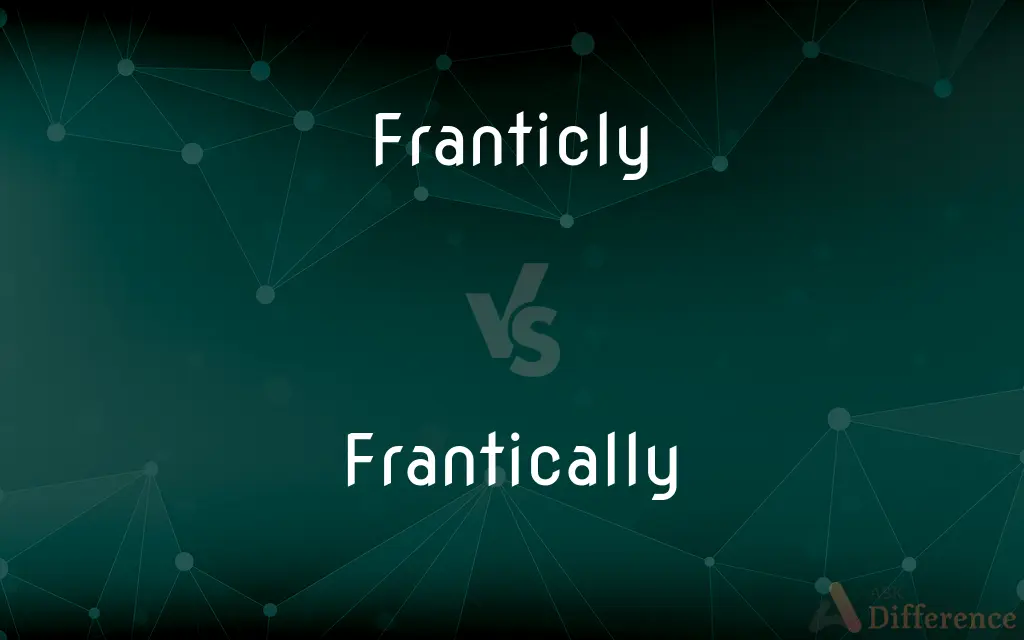Franticly vs. Frantically — What's the Difference?
Edited by Tayyaba Rehman — By Maham Liaqat — Updated on April 1, 2024
Frantically emphasizes a wild, hurried manner, while Franticly is least commonly used but conveys a similar sense of desperation or chaos.

Difference Between Franticly and Frantically
Table of Contents
ADVERTISEMENT
Key Differences
Frantically is often used to describe actions done in a wild, desperate, or hurried manner, suggesting a level of intensity and urgency in the behavior. On the other hand, Franticly, while technically a variant of frantically, is much less common in modern usage and might be considered incorrect or outdated by some.
Both adverbs stem from the adjective "frantic," which describes a state of extreme mental agitation, uncontrollable emotion, or wild behavior. However, "frantically" is the preferred adverbial form to describe actions carried out in such a state, while "franticly" is rare and might be seen as an alternative spelling rather than a standard form.
In spoken and written English, "frantically" is overwhelmingly the choice of speakers and writers to convey actions performed in a desperate, frenzied manner. This preference is evident in literature, news reporting, and everyday conversation, where precision and clarity are valued. The dominance of "frantically" demonstrates the natural evolution of language, where certain forms gain favor over others for reasons of euphony, ease of use, or convention.
While both adverbs relate to the adjective "frantic," their usage highlights the dynamic nature of language and the importance of context in choosing words. "Frantically" serves as a clear, widely recognized way to describe actions marked by desperation or panic, reinforcing the importance of selecting the most effective word to convey a particular meaning or tone.
Comparison Chart
Common Usage
Less commonly used, considered less correct or outdated.
Widely used to describe actions done in a desperate or chaotic manner.
ADVERTISEMENT
Implication
Aims to convey a similar sense but is not standard.
Conveys a sense of urgency, disorder, or panic.
Origin
Alternative, less accepted form of "frantically."
Standard adverbial form of "frantic."
Preferred Context
Rarely used; may appear in regional dialects or historical texts.
Formal and informal writing and speech.
Perception
Often viewed as incorrect or a misspelling of "frantically."
Viewed as the correct form to describe desperate actions or states.
Compare with Definitions
Franticly
In a frantic manner.
She looked around franticly, unable to find her way.
Frantically
In a hurried, disorganized, or panicked manner.
She searched frantically for her lost keys.
Franticly
Indicating a high level of distress or urgency.
He spoke franticly, trying to convey the emergency.
Frantically
With great fear or desperation.
He called out frantically, hoping someone would hear him.
Franticly
Demonstrating a loss of composure or calm.
Messages were sent franticly across the network.
Frantically
Exhibiting extreme emotion or activity.
The crowd moved frantically to the music.
Franticly
With a sense of being overwhelmed or out of control.
The team worked franticly on the project.
Frantically
With a lack of control or order.
Papers were scattered frantically across the desk.
Franticly
In a manner showing extreme concern or anxiety.
She watched the news franticly for updates.
Frantically
Highly excited with strong emotion or frustration; frenzied
Frantic with worry.
Franticly
Highly excited with strong emotion or frustration; frenzied
Frantic with worry.
Frantically
Characterized by rapid and disordered or nervous activity
Made a frantic last-minute search for the lost key.
Franticly
Characterized by rapid and disordered or nervous activity
Made a frantic last-minute search for the lost key.
Frantically
(Archaic) Mentally deranged.
Franticly
(Archaic) Mentally deranged.
Frantically
In a frantic way.
Franticly
(rare) In a frantic manner.
Frantically
In an uncontrolled manner;
They searched frantically for their child
Common Curiosities
Why is "frantically" preferred over "franticly"?
"Frantically" is standardized and recognized as correct in formal and informal contexts.
What does "frantically" imply?
It implies actions done in a desperate, disorganized, or panicked manner.
Is "frantically" used in formal writing?
Yes, it is widely accepted in both formal and informal contexts.
How are "frantically" and "franticly" related?
Both derive from the adjective "frantic," but "frantically" is the preferred adverbial form.
Can "frantically" and "franticly" be used interchangeably?
Technically, yes, but "frantically" is far more acceptable and widely used.
Is "franticly" a correct word?
While it can be found, it is less common and often considered incorrect or outdated.
What type of actions does "frantically" describe?
It describes actions performed in a hurried, panicked, or disorganized manner.
Does "franticly" appear in modern writing?
It's rare and generally not preferred in modern writing or speech.
How does "frantically" affect the tone of a sentence?
It adds a sense of urgency, desperation, or chaos to the described actions.
How does context affect the choice between "frantically" and "franticly"?
"Frantically" is almost always the better choice for clarity and correctness.
Are there synonyms for "frantically" that avoid this confusion?
Yes, words like "hurriedly," "desperately," or "panickedly" can serve similar purposes.
What is the origin of "frantically"?
It comes from the adjective "frantic," meaning wildly excited or anxious.
Is it important to differentiate between "frantically" and "franticly" in writing?
Yes, to ensure clarity, correctness, and adherence to standard language conventions.
How do "frantically" and "franticly" reflect language evolution?
Their usage demonstrates how certain forms become preferred over time for various reasons.
Can "franticly" be found in dictionaries?
It might appear as a variant but is not the standard form.
Share Your Discovery

Previous Comparison
Coyote vs. Fox
Next Comparison
Alumnus vs. AlumnaAuthor Spotlight
Written by
Maham LiaqatEdited by
Tayyaba RehmanTayyaba Rehman is a distinguished writer, currently serving as a primary contributor to askdifference.com. As a researcher in semantics and etymology, Tayyaba's passion for the complexity of languages and their distinctions has found a perfect home on the platform. Tayyaba delves into the intricacies of language, distinguishing between commonly confused words and phrases, thereby providing clarity for readers worldwide.













































